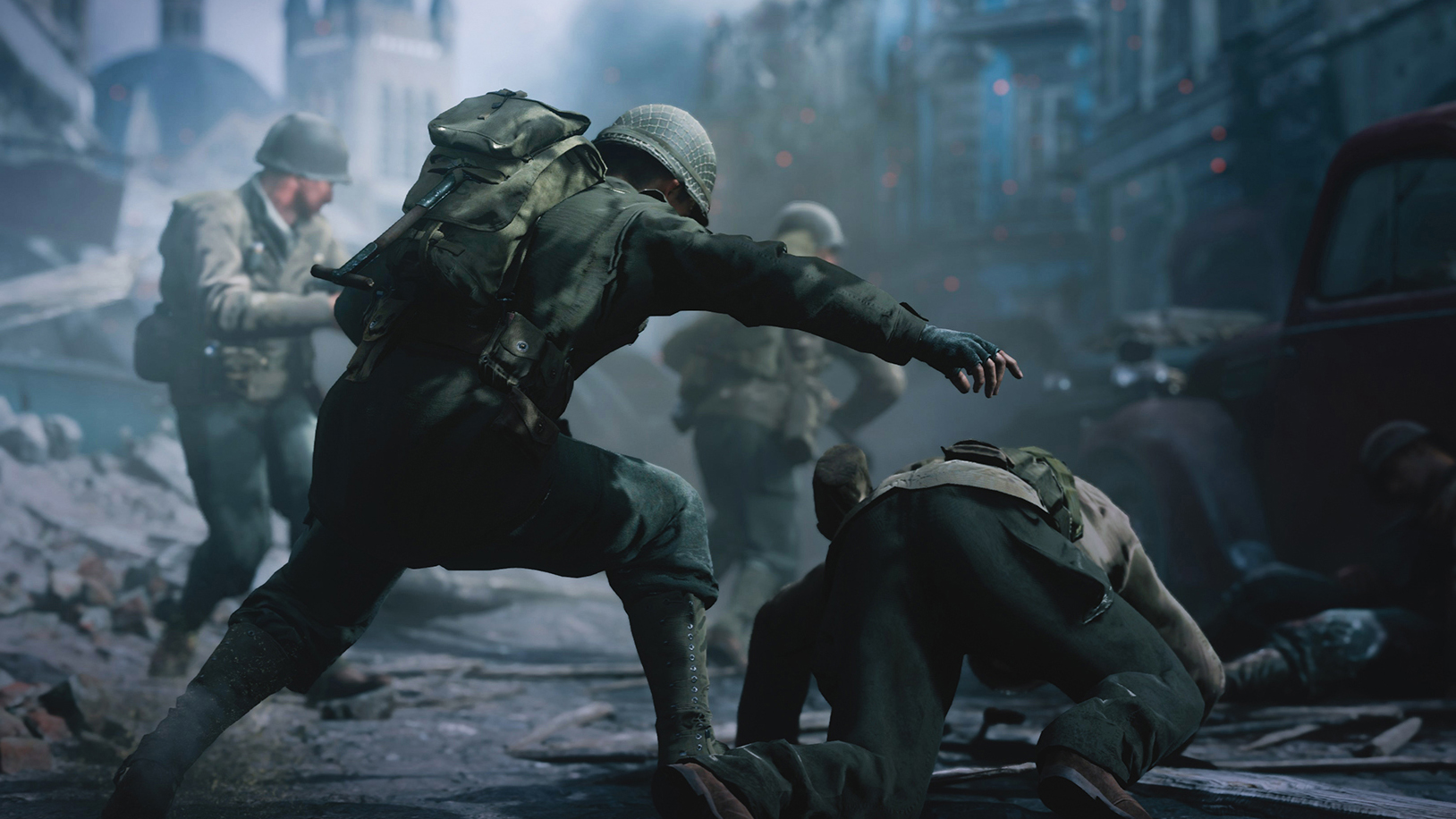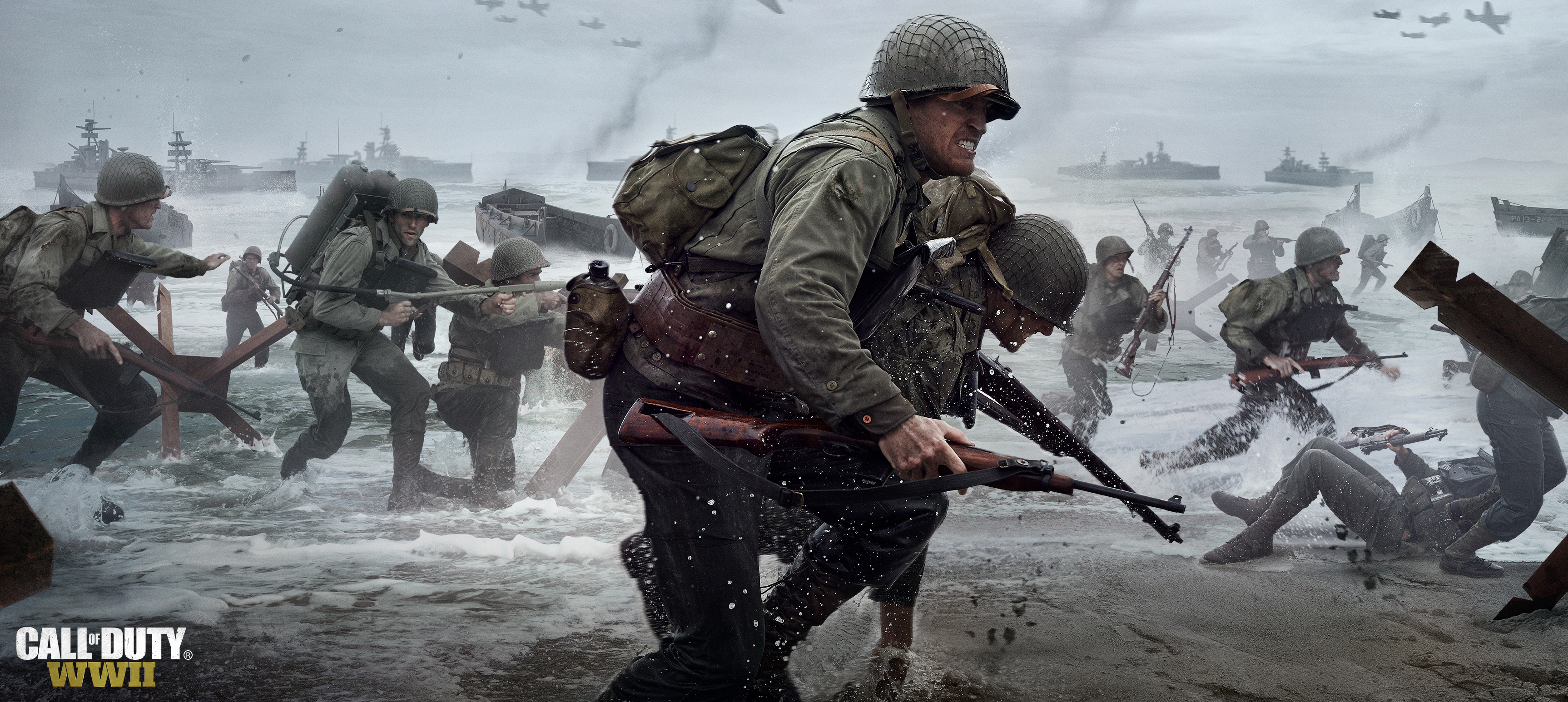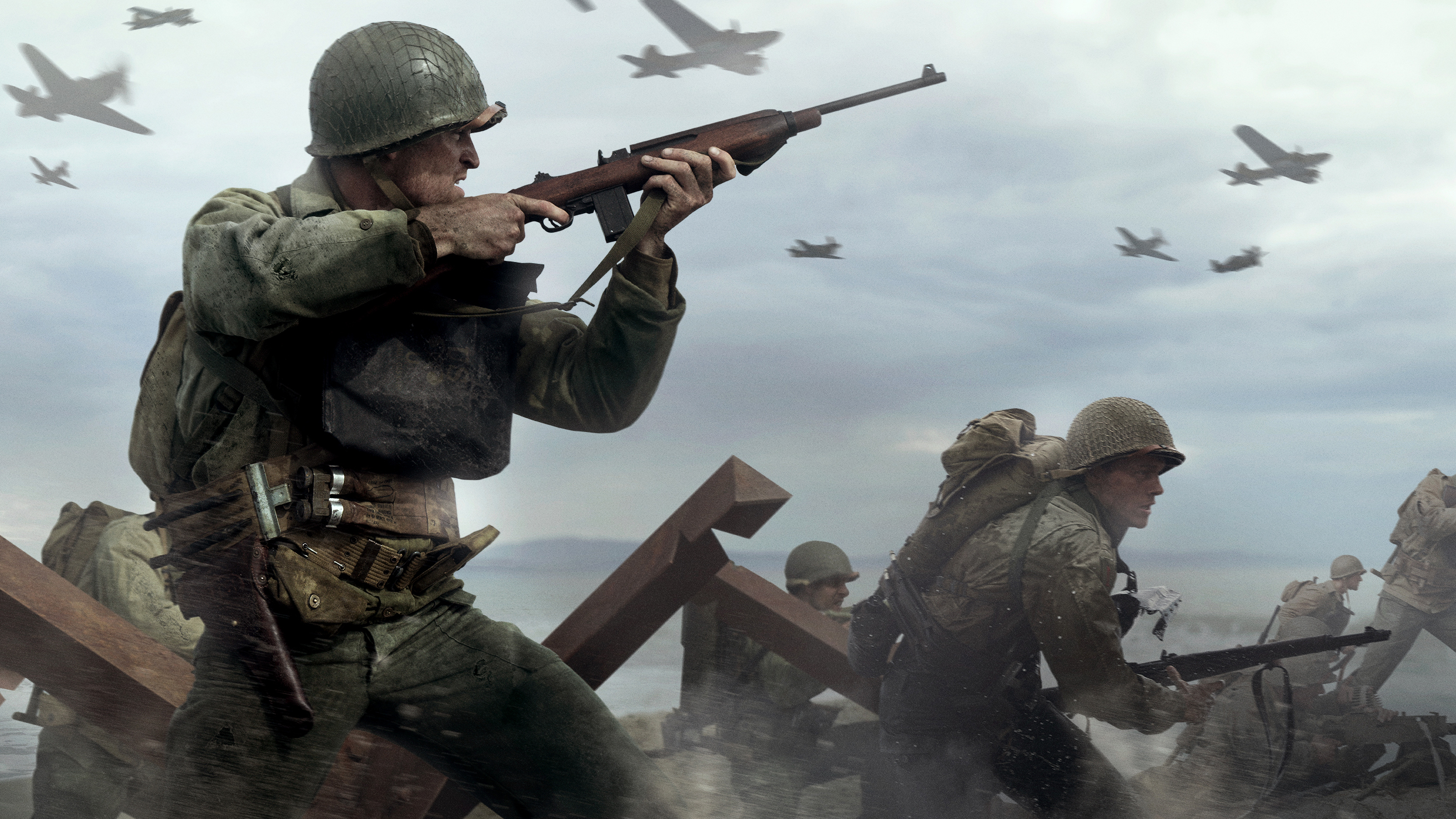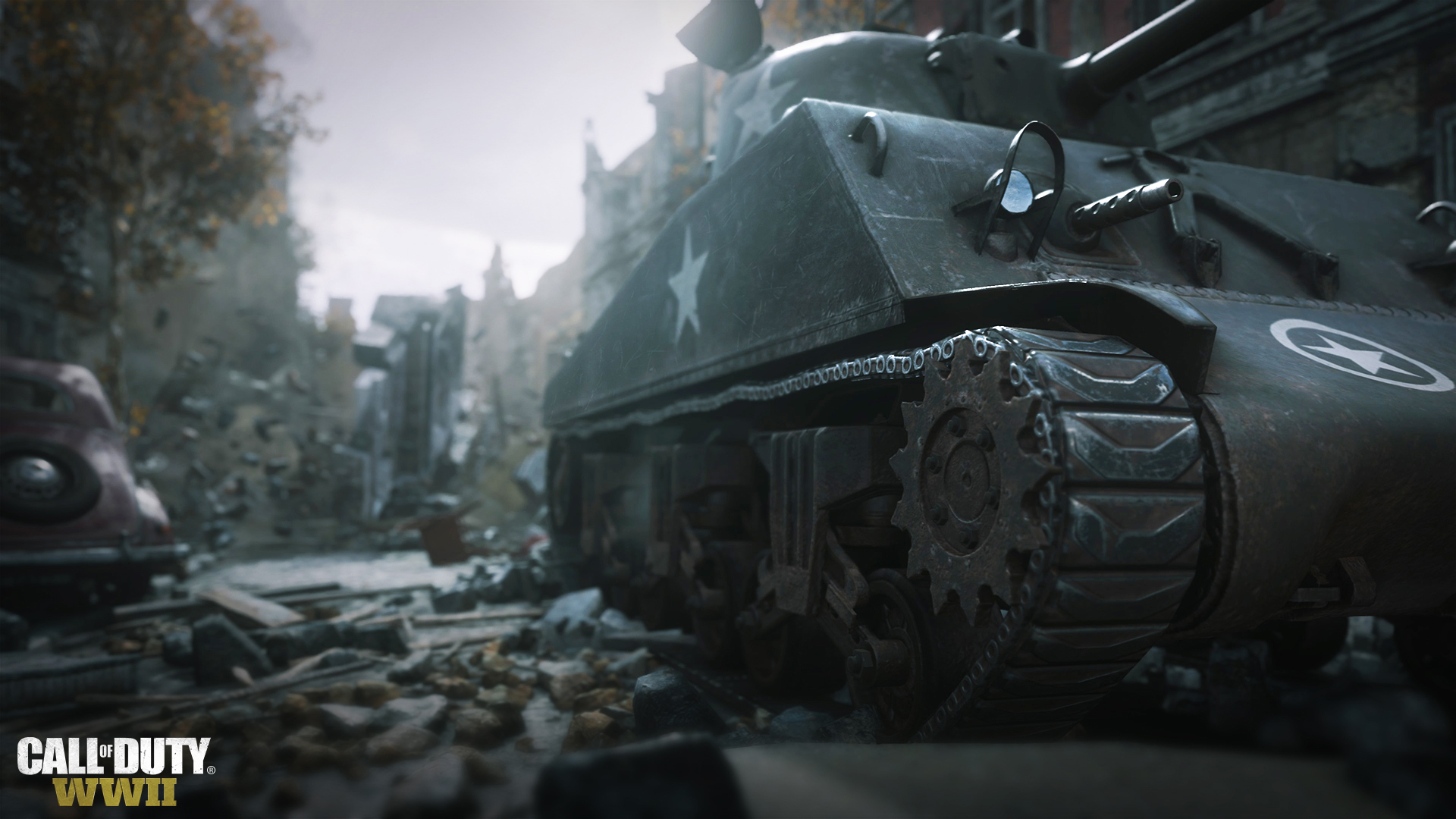Don't try to sell Call of Duty to us as anti-war
Some absurd claims were made at the Call of Duty: WWII reveal event.

The Call of Duty: WWII reveal event was equal parts bold and hilarious. From what we heard, the new game sounds like a bog standard Call of Duty with a well-trod WWII story that puts America center stage. It may well be the best-selling game of 2017, and it should move the CoD series away from its current 'more is more' trajectory of gadgetry, drones, and exoskeletons as seen in Advanced and Infinite.
But if you believe the developers at Sledgehammer—take a big sip of coffee before continuing—the actual reason Call of Duty has returned to World War 2 is to prevent World War 3.
“When we started this journey almost three years ago,” Sledgehammer co-founder Michael Condry said during the livestream, “it was really [about] wanting to tell a really impactful narrative and story, largely to ensure this sort of conflict doesn’t happen again.”
While you squeegee the spit off your monitor, let’s consider that claim. If CoD:WWII is "largely" about scaring its players straight on modern history, it has an odd way of showing it. The pacifist message is at odds even with the first in-game footage, which mainly glorifies, or at least maintains the idea that WWII was a brutal but noble conflict—hellish and awful, yes, but with “visceral gameplay.” There are flamethrowers backed by opera singers. A man yelling “we had orders!” before being socked in the face. Drums that pound to the beat of gunfire. A logo that slaps the screen and shakes with anticipation for battle.
"This is a story that's bigger than all of us," said audio director David Swenson in a mock documentary shown at the reveal. "This is a whole new generation who might not have a lot of experience with this time period. I think this is a great opportunity to have them experience that and feel that."
Introducing a generation to the largest conflict in modern history is a lofty goal, so one can assume that how this brutal crisis is portrayed was not approached lightly. Yet through all the “authenticity” and “grittiness,” I saw little substance in the reveal. It sounds more like Activision is glad younger players haven’t seen Saving Private Ryan so it can produce precisely that. And if Saving Private Ryan was my generation’s primary introduction to and education about World War 2, then we must be very poorly informed—though I don’t recall even Steven Spielberg making such bold claims before that film released, nor when he directed a game, Medal of Honor. (I haven't watched every single interview, to be fair.)
CoD:WWII’s educational claims come off as insecure at best, disingenuous at worst. And I might have brushed off one comment as the hyperbolic yammering of an earnest but overzealous developer, but this pompousness occurred so frequently during the reveal that I could practically reverse engineer the memo it came from.
Keep up to date with the most important stories and the best deals, as picked by the PC Gamer team.

Empathy machineguns
I wholeheartedly reject the idea that Call of Duty generates empathy, and I don’t think its goal should be to generate empathy.
If CoD:WWII causes any of its players to further investigate fascism, war, and genocide, then I will be glad, but it's hard to take such a goal seriously from the series that coined the word “killstreak,” invited you to drop an atomic bomb on your opponents as a reward, and famously reduced mourning to a button tap.
It's also uncomfortable to hear a developer praise the cultural impact of its game before it's even released. Players—not Activision—will decide what the game accomplishes. And to be clear, I don’t object because CoD:WWII is a game, and I’m a stodgy grump who believes games can’t be subversive or educational or lead us to new ideas and interests—they definitely can and I love them for it—it’s because I’m not buying for a second that CoD is really interested in much more than action drama (which would be fine).
According to Condry, Call of Duty: WWII is Sledgehammer's "chance to tell the epic, gritty, visceral story of the world's greatest conflict." But it’s also “authentic”—a term, by the way, used to describe every other Call of Duty game, no matter how far-flung the fiction—and yet I never recall my grandfather referring to the war as “epic” or “gritty” or “visceral.”
My guess is that Condry is hinting that CoD:WWII will include one or two of the series' controversial scenes, such as Modern Warfare 2’s No Russian mission, or inclusion of Manuel Noriega in Black Ops 2. The shock of these scenes has sparked discussion, debate, and weird lawsuits. But compartmentalizing tragedy into a single level or story beat is a different thing than setting out to present the history of World War 2, its atrocities and violence and crimes and the economic, political, and ideological forces that carved it into history as the mold for our violent modern world.

Yet they say it again and again.
"Not only is it a kickass game, but because they spent so much time making this historically accurate, it's going to expose the whole WWII story to a whole new generation,” said actor Josh Duhamel during the livestream, “and I'm really honored to be a part of this game for that reason."
"Lots of people are writing articles about that at the moment, saying that this is how we get our history now, it’s through this,” added host OJ Borg. “There's almost more empathy when you're fighting through an interactive character.”
I’ll mostly ignore the claim that we now learn history through blockbuster FPSs—do we really?—and focus on empathy, that corroded, co-opted word. I wholeheartedly reject the idea that Call of Duty generates empathy, and I don’t think its goal should be to generate empathy. The fun parts of Call of Duty rely on a lack of empathy, at least in the moment. If I truly felt the suffering of any Call of Duty character, I’d quit immediately. (On that note, I recommend reading game designer Robert Yang’s compelling rebuttal to VR machines as ‘empathy machines.’)
Fear and pre-orders
This isn't the first time Call of Duty has tried to spin its Michael Bay fare into serious social commentary.
So where does this sense of self-importance come from? Does it arise out of insecurity that pursuit of entertainment revenue is an insufficient response to modern crises? Maybe on an individual level. But I suspect that these repeated lines about educating a generation come from the marketing dept.
This isn't the first time Call of Duty has tried to spin its Michael Bay fare into serious social commentary. When Activision presented Black Ops 2 to press for the first time in 2012, it laid out the global issues that Black Ops 2's campaign would supposedly tackle: how scarcity of technological materials would lead us into a resource struggle with China. Treyarch went so far as to produce a five-part documentary series featuring authors, veterans, and political commentators insisting that the scenario was not only plausible, but probable.
“I don’t think the average American grasps how violent war is about to become,” says retired Lt. Col. Oliver North in the first episode. “I don’t worry about a guy who wants to hijack a plane. I worry about a guy who wants to hijack all the planes.”
This fear-mongering went so far as to prompt rebuttals. “Alright, I can’t believe I need to say this, but the future will not look like Call of Duty,” wrote J. Dana Stuster on Foreign Policy, disputing the idea that rare earth minerals were going to drive the next global conflict.
It’s true that the future presents many unknowns and dangers: growing inequality, far-right nationalism, global warming, increased workforce automation, nuclear proliferation, technological excess. Call of Duty has historically offered no solution to these problems, no better world. The series aligns with an idea that has dominated the past two decades of politics: that these fears are unstoppable, war is inevitable, and the purpose of the state is to protect us with bigger and bigger militaries. In Call of Duty’s universe, war will always come, whether waged by ultranationalist terrorists or the private armies of Advanced Warfare or the space fascists of Infinite Warfare, and we can only hope to contain it with heroism and sacrifice. (Mind you, that's to contain it for ourselves, not those we inflict it on.)
The truth is that the idea to return to WWII was a business decision, not a purely creative one, as Activision CEO Eric Hirshberg told Polygon before the reveal. “In this particular case I do think the impetus for the discussion started with those of us who manage the franchise overall,” he said, referring to Activision’s leadership.
If Activision’s execs truly made the decision to return Call of Duty to World War 2 as a calculated attack on white nationalism, oppression, genocide, and imperialism—a firm anti-war statement and denouncement of the liberal and conservative pundits who recently fawned over Tomahawk missile strikes—then I’ll eat my shoe faster than Werner Herzog.

If Sledgehammer really makes good on this lofty goal, perhaps CoD:WWII will depict the Soviet liberation of Auschwitz and the death march that preceded it. I don’t know how one would handle such atrocities with historical rigor and without trivializing them in a game that also includes Nazi zombies, and don’t envy anyone who might have the task of doing so.
Of course, I doubt Call of Duty: WWII will really do this (though perhaps they'll prove me wrong). Not many mainstream games have attempted to portray the Holocaust at all, or remark on the horrors of war in a way that doesn’t contribute to the “visceral gameplay” promised by CoD. In fact, Valkyria Chronicles—a JRPG set in an alternate universe version of WWII—addresses racism and genocide more thoroughly than Call of Duty ever has. So I have my doubts that Call of Duty: WWII is really what its creators claim it to be, and what I never expected it to be. I hope it's fun, though.

Tyler grew up in Silicon Valley during the '80s and '90s, playing games like Zork and Arkanoid on early PCs. He was later captivated by Myst, SimCity, Civilization, Command & Conquer, all the shooters they call "boomer shooters" now, and PS1 classic Bushido Blade (that's right: he had Bleem!). Tyler joined PC Gamer in 2011, and today he's focused on the site's news coverage. His hobbies include amateur boxing and adding to his 1,200-plus hours in Rocket League.

